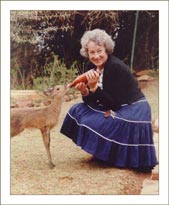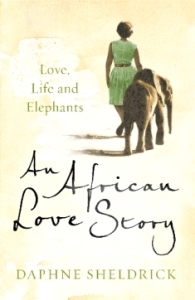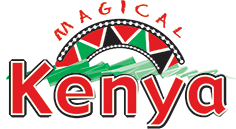For over 25 years, from 1955 until 1976 , Kenya born Daphne Sheldrick lived and worked alongside her late husband, David Sheldrick, famous Naturalist and founder Warden of Kenya’s giant Tsavo East National Park in which he served from 1948 until 1976. During that time she raised and rehabilitated back into the wild community orphans of misfortune from many different wild species, including Elephants aged two and upwards; Black Rhinos, Buffaloes, Zebra, Eland, Kudu, Impala, Duikers, Reedbuck, Dikdiks, Warthogs and many smaller animals such as civets, mongooses and birds. She is a recognized International authority on the rearing of wild creatures and is the first person to have perfected the milk formula and necessary husbandry for both infant milk dependent Elephants and Rhinos.
The key to her success has been her life-long experience of wild creatures, an in-depth knowledge of animal psychology, the behavioural characteristics of the different species, and, of course, that most essential component, a sincere and deep empathy.
For her work in this field Daphne Sheldrick was decorated by the Queen in 1989 with an M.B.E., elevated to U.N.E.P.’s elite Global 500 Roll of Honour in 1992, among the first 500 people worldwide to have been accorded this particular honour, and awarded an Honorary Doctorate in Veterinary Medicine and Surgery by Glasgow University in June 2000. In December 2001 her work was honoured by the Kenya Government through a prestigious decoration – a Moran of the Burning Spear (M.B.S.), and in 2002 by the B.B.C. when she received their Lifetime Achievement Award. In the November 2005 issue of the Smithsonian Magazine Daphne Sheldrick was named as one of 35 people worldwide who have made a difference in terms of animal husbandry and wildlife conservation.
In the 2006 Ne w Year’s Honours List, Queen Elizabeth II appointed Dr. Daphne Sheldrick Dame Commander of the Most Excellent Order of the British Empire, the first Knighthood to be awarded in Kenya since the country received Independence in 1963.
w Year’s Honours List, Queen Elizabeth II appointed Dr. Daphne Sheldrick Dame Commander of the Most Excellent Order of the British Empire, the first Knighthood to be awarded in Kenya since the country received Independence in 1963.
The David Sheldrick Wildlife Trust is a small flexible charity. From its inception in 1977 the Trust has played an extremely significant and important role in Kenya’s conservation effort. Tsavo National Park is the Trust’s main focus. It is Kenya’s largest wildlife refuge, and offers the best long-term hope for the perpetuation of a greater number of species than any other Park in the world. The Trust has also been active in an educational capacity in the Nairobi area, as well through articles for the Wildlife Clubs of Kenya and the Press. It has funded field trips for students and provided advanced training in wildlife management for promising students.
All the elephant orphans raised by the Trust are gradually rehabilitated back into the wild elephant community of Tsavo National Park when grown, a transition that is made at their own pace and in their own time, but usually taking approximately eight to ten years. A number of our ex Nursery orphans have now had wild born young which they have brought back to show their erstwhile human family, and others are now pregnant and living free, yet keeping in touch with those who are still Keeper dependent. Amongst these are many orphaned too young to have any recollection of their elephant mother or family.
Helping save the lives of orphaned Elephants and Rhinos who are ultimately released back into the wild is just some of the many wildlife commitments The David Sheldrick Wildlife Trust is involved in. The Trust runs seven full time Desnaring teams, two mobile Veterinary Units, and is active in a Community Outreach Program along with working with the communities in an educational capactiry locally, and through articles for the Wildlife Clubs of Kenya, the Press and Radio Programs. The Trust has also provided advanced training in wildlife management for promising students.
The Trust continues to provide a blueprint for the welfare of animals in captivity and, in the case of elephants, illustrated the sophistication of their communication and their social needs. It has perpetuated vital field knowledge and experience that would otherwise have been lost, and made it available to all national parks in East Africa and many beyond.
 The Trust provides continual support for The Kenyan Wildlife Service through our Desnaring efforts within the Tsavo Ecosystem and the Mobile Veterinary Units, but also through support of security fuel, and electrically fencing sensitive National Park boundaries, alleviating human wildlife conflict. The Trust supports indigenous tree nurseries, and water projects in both Tsavo National Park and in the bordering community areas.
The Trust provides continual support for The Kenyan Wildlife Service through our Desnaring efforts within the Tsavo Ecosystem and the Mobile Veterinary Units, but also through support of security fuel, and electrically fencing sensitive National Park boundaries, alleviating human wildlife conflict. The Trust supports indigenous tree nurseries, and water projects in both Tsavo National Park and in the bordering community areas.
Dr. Daphne Sheldrick manages the animal orphanage, at the edge of Nairobi National Park, where she oversees the rehabilitation of numerous elephant, rhino and other animal orphans. Through the Trust’s input, other elephants have been saved elsewhere in Africa. Many older elephant orphans have been retrieved in an emaciated condition during drought periods, and once rehabilitated, have been successfully reunited with wild herds. In the summer of 2001 members of FOAI visited with Dr. Sheldrick and discussed ways that FOAI might be of service to her efforts in the future. FOAI also made a financial contribution to her efforts. Dr. Sheldrick serves on the International Advisory Board of Friends of Africa International.
 “Saving wildlife and wilderness is the responsibility of all thinking people. Greed and personal gain must not be permitted to decimate, despoil and destroy the earth’s irreplaceable treasure for its existence is essential to the human spirit and the well-being of the earth as a whole. All life has just one home – the earth – and we as the dominant species must take care of it.”
“Saving wildlife and wilderness is the responsibility of all thinking people. Greed and personal gain must not be permitted to decimate, despoil and destroy the earth’s irreplaceable treasure for its existence is essential to the human spirit and the well-being of the earth as a whole. All life has just one home – the earth – and we as the dominant species must take care of it.”
Dr. Dame Daphne Sheldrick
Friends of Africa International has been a proud supporter of the David Sheldrick Wildlife Trust. For more information, please visit the trust online.










